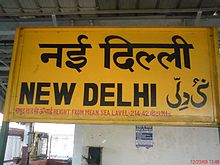Delhi
![]()
Dilli is a redirect to this article. For the Brazilian religious clergyman, bishop of Santa Cruz do Sul, see Aloísio Alberto Dilli.
![]()
The title of this article is ambiguous. For other meanings, see Delhi (disambiguation).
Delhi (Hindi दिल्ली, Urdu دلی, Panjabi ਦਿੱਲੀ; Dillī) is a metropolis in northern India and, as the National Capital Territory of Delhi (NCT), a Union Territory directly under the Central Government of India. Delhi is part of the National Capital Region. Delhi includes New Delhi, the capital of India.
The Union Territory is directly under the central government of India, although since 1992 it has enjoyed a degree of autonomy through a special status. Thus, Delhi has its own parliament (Delhi Legislative Assembly) and its own government, headed by a chief minister elected by parliament. The capital territory of Delhi, which forms a single agglomeration, has been divided into eleven districts and five local governments since 2012.
The capital territory of Delhi had a population of around 16.8 million in the 2011 census and is one of the world's megacities.
The National Capital Region is a planning authority introduced in 1991, which includes large parts of the adjoining states of Haryana and Uttar Pradesh and up to Rajasthan with the major cities of Gurugram, Ghaziabad, Noida, Faridabad, Meerut etc., thus co-administering about 45 million people.
City name
The name of the city in Western languages is Delhi. In the local languages (Hindi, Urdu and Panjabi) Delhi is usually called Dillī. In addition, there is the variant Dehlī or Dihlī, which was originally used mainly by the Muslims. The name is thought to derive from the ancient Hindustani word dil for "hill". The name is also often derived from a legendary king named Dhilu, who is said to have ruled Delhi in the 1st century BC. A derivation from the Sanskrit word dehalī for "threshold" or the Persian dehlīz for "plank" has also been suggested; according to this, the name would refer to Delhi's location on the "threshold" between Punjab and the Doab. The derivation from the Persian Hindustani word dil for "heart" (Delhi would thus be the "city of the heart"), on the other hand, must be considered a folk etymology.
More recently, it has been proposed to change the English name of the city from Delhi to Dilli. Similarly, a number of other Indian cities have had their colonial-era names replaced (cf. the renaming of Bombay to Mumbai, Calcutta to Kolkata, and Madras to Chennai).
The relationship between the names Delhi and New Delhi is complex. In a narrow sense, New Delhi only refers to the government district that was laid out according to plan during the British colonial period. This also corresponds to the administrative boundaries of New Delhi. However, New Delhi is often used complementarily to Old Delhi or Old Delhi to refer to all areas of Delhi outside Shahjahanabad. Often the names Delhi and New Delhi are entirely interchangeable.

Trilingual station sign (Hindi, English, Urdu) at New Delhi railway station.
Geography
Geographical location
Delhi is situated on the river Yamuna an average of 216 meters above sea level.
Climate
The average annual temperature is 25 degrees Celsius and the average annual rainfall is 719 millimeters. The warmest month is June with an average of 33.4 degrees Celsius and the coldest is January with an average of 14.5 degrees Celsius. The most precipitation falls in the month of August with an average of 206 millimeters, the least in November with 4 millimeters on average.
| Delhi | ||||||||||||||||||||||||||||||||||||||||||||||||
| Climate diagram | ||||||||||||||||||||||||||||||||||||||||||||||||
| ||||||||||||||||||||||||||||||||||||||||||||||||
| Monthly average temperatures and precipitation for Delhi
Source: India Meteorological Department/World Meteorolocical Organization; wetterkontor.de | ||||||||||||||||||||||||||||||||||||||||||||||||||||||||||||||||||||||||||||||||||||||||||||||||||||||||||||||||||||||||||||||||||||||||||||||||||||||||||||||||||||||||||||||||||||||||||||||||||||||||||||||||||||||||||||||||||||||||||||||||||||||||||||
Search within the encyclopedia